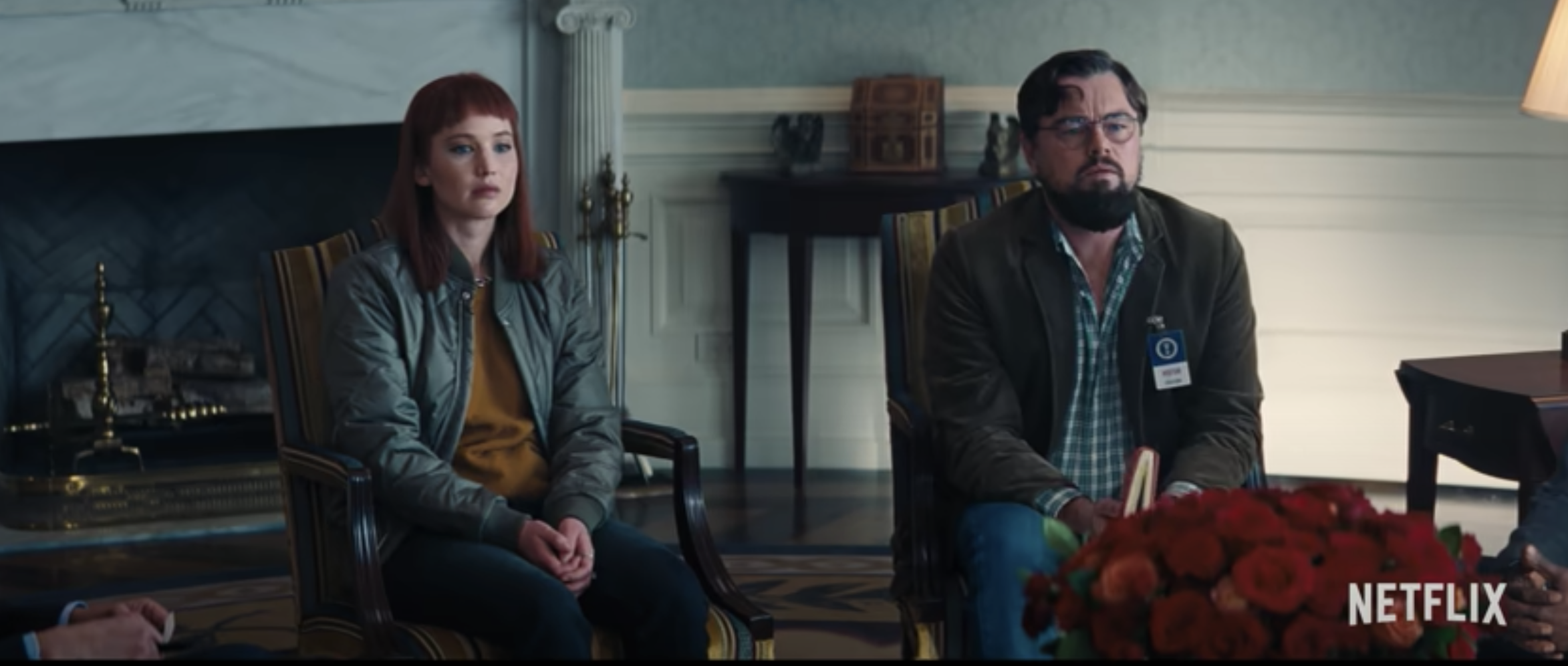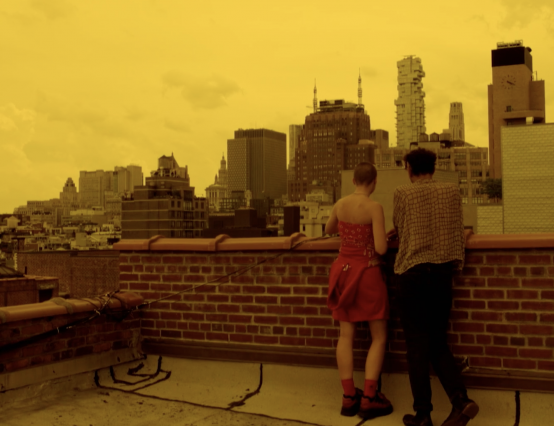It’s no secret that we are approaching a terrifying epoch; the climate crisis looms over us as temperatures tick upwards and natural habitats begin to erode. The recent heatwave, when UK temperatures lurched over 40°C for the first time, is a stark reminder that the climate crisis is not a hypothetical possibility anymore. It’s our tangible reality, and it’s scary and devastating.
Given the horrors we can expect from our exploitation of our planet, why do films, shows and books use the climate crisis - or its implications - as background? From the allegorical, like Don’t Look Up, to depictions of climate change’s tangible effects, like Snowpiercer, fictional media has been latching onto the crisis as a source of entertainment over the past decade.
But how much does the media we engage with effect our views on climate change? When asked whether this type of media makes them more concerned about the impending crisis, or finds that it trivialises it, surveyees appeared split down the middle (28% to 24%). Almost half (48%) found fictional media depicting the effects of the climate crisis had no effect on how they felt about it. One response described it as a “tricky balance” and that “sometimes part of me doesn’t want to watch these films knowing they’ll induce anxiety, [...] but I know how important the medium is for provoking conversation and ultimately change!”
 Don't Look Up | Credit: Netflix via Youtube
Don't Look Up | Credit: Netflix via Youtube
Does allegorising the crisis actually make us think?
Netflix’s Don’t Look Up (2021) was “lauded” by climate activists, according to Donna Lu, a science writer for The Guardian; in it, two astronomers - Jennifer Lawrence and Leonardo DiCaprio - embark on a media tour, warning the public of an approaching, earth-destroying comet. They are widely ignored and dismissed, and many consider the film an allegory of our impending climate crisis. As Lu elaborates, the film’s “central focus – an urgent message falling on deaf ears – has struck many climate scientists and activists as altogether too familiar.”
The recent heatwave led Twitter users to document the spate of media appearances of climate activists, almost uncanny in similarity to the dismissal of DiCaprio and Lawrence’s characters in Don’t Look Up when they warn people about the incoming comet on TV. Is the barrier between fiction and reality blurring when representing this crisis?
Lu says, “It's unsurprising to me that we're seeing the climate crisis widely represented in popular culture. We're all – artists and writers included – grappling with what is arguably the biggest global issue of our time.”
“I think the best fictional depictions of climate change reveal essential truths about the human condition or a current situation or imagine the possible consequences of our inaction without necessarily being didactic. They range from the contemplative – Jenny Offill's novel Weather, say – to the nihilistic – Cormac McCarthy's The Road comes to mind.”
As Lu mentions, beyond merely providing entertainment, fictional media can be a way to ruminate on and even begin to address dire eventualities if we, as a society, continue on this destructive path. Another film starring Jennifer Lawrence, Mother! (2017) was described by Lawrence as a “hard film to watch”, depicting the “torment of Mother Earth”. In this psychological horror, Lawrence’s character represents Mother Earth. Whilst viewers have to make this implicit connection themselves, connecting the plot to humanity’s treatment of the earth and its resources may cause watchers to consider their impact as a result of cognitively creating this connection.
The climate crisis as an entertainment backdrop
Rather than using film and TV as a medium for allegorising the climate crisis, some - such as The Day After Tomorrow and the BBC series Years and Years - use it as a backdrop for the plot. Years and Years depicts a dystopian future for a family living in England, who grapple with intense political, social and ecological change. Not even ten days down the line, England experienced a destructive eighty consecutive days of rain, 80% of insects had been eradicated, and the North Pole had melted.
This more explicit approach to representing the climate crisis may make it easier for viewers to connect the film to its environmental themes. For some viewers, this may mean they’re not ‘tricked’ into thinking deeply about these thematic issues, as they might with an allegorical film. But for others, having the destruction played out right on the screen may motivate them to take action. With more allegorical media, they may have missed a more tenuous connection.
This suggests that this issue is more nuanced than the depiction of the climate crisis in the media, either motivating climate consciousness or trivialising the matter completely. It depends on the individual portrayal and the critical reception this receives more generally on how the topic is enacted thematically and through the plot. As demonstrated by the aforementioned poll - which divided respondents in their thoughts on how fictional representations of the climate crisis make them feel - it also depends on personal media consumption and individual reactions.
One poll respondent commented, “whilst I agree that it's important to provoke conversations around climate change, and media is a great medium to use to do this, it feels a bit hypocritical when the process of consuming film and TV generates a pretty staggering carbon footprint in itself”.
These industries have an obscene environmental impact: Netflix, which hosts Don’t Look Up, estimates that an hour of streaming produces under 100g of CO2 per hour, with The Carbon Trust clarifying these estimates as 55g to 56g. But this quantity adds up quickly: Don’t Look Up earned the highest number of views in a week in Netflix’s history, with more than 152 million hours streamed. That’s over 8360 tonnes of CO2 in one week of streaming, equivalent to 5434 households' average CO2 emissions in an entire year.
How can we compare this to the beneficial, climate-positive impact films and shows might have on individuals, which is a virtually impossible metric to quantify? Are these productions having a physically negative impact on the environment, insurmountable by any possible positives?
 Years and Years | Credit: BBC via Youtube
Years and Years | Credit: BBC via Youtube
Contemplating the crisis through literature
As Lu pointed out, books - like Offill's Weather and McCarthy’s The Road - can offer a ruminative and provocative presentation of the climate crisis through text. Speculative climate fiction is an increasingly popular platform for expressing thoughts on the impact of global warming on our world.
Miranda Iossifidis’ work on reimagining climate futures considers how “speculative fiction can be understood as a generative way to participate in a wider reckoning with the idea, and increasingly the experience, of [the] climate crisis”.
Climate fiction - or ‘cli-fi’ - gives writers a chance to confront the crisis and speculate on what the realities of occupying a world battered by climate change might entail in the future. Iossifidis focuses on Jeff VanderMeer’s Annihilation, a novel about four women setting out into an area known as Area X.
As she puts it, “Annihilation grapples with the ways in which the climate crisis is profoundly transforming our sense of what nature has been and what humans might become.”
She ultimately asserts that his newfound genre can offer ways to understand and live with the climate crisis.
Does entertainment need to reflect on how it approaches depictions of climate change?
Regardless of the medium - books, TV, film, music, or art - the creative choices made by the producers of this content dictate whether the work will be received prohibitively or proactively. There are always individual fluctuations in the reception of entertainment and artwork, person-to-person. Producers of entertainment must be reflexive of how their work portrays environmental issues.
Nicholas Barber asserted in an article for the BBC Culture back in 2020 that cinema ignores climate change and describes Hollywood as “squeamish” to include representations of the environmental crisis. We need more depictions of the climate crisis and its effects on society - but these must be sensitive and nuanced. Introducing the climate crisis into the plot or as a backdrop to a piece of entertainment may simply be reductive if it’s not considered carefully. A surveyee responded: “when the climate crisis, or its effects, are shown in TV and film, it almost numbs me to the reality of it. It embarrasses me that it's not hard for me to watch anymore.” This is the outcome people who create entertainment must be wary of.
Entertainment and the media have a huge responsibility over how people’s opinions about the climate crisis are developed. If a writer decides to centre their script or novel on these huge environmental questions and issues, they are taking it upon themselves to depict the crisis in a way that will motivate change or at least get people to think. We’re at a point in a disastrous ecological trajectory that makes it dangerous for writers, directors and producers to do otherwise.









0 Comments